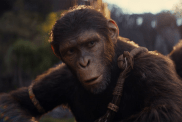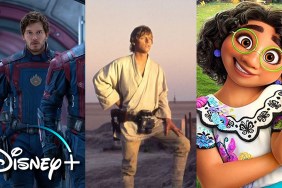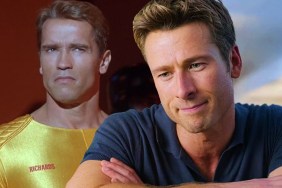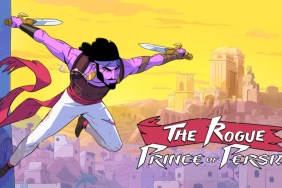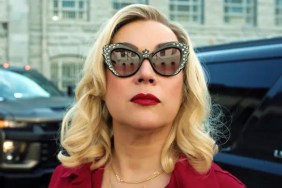
Interview with Pan director Joe Wright
Director Joe Wright is no stranger to adapting beloved classics that have already been seen in previous incarnations, having started his film career with a new version of Jane Austen’s Pride & Prejudice, starring Keira Knightley. They reunited years later to make the seventh movie based on Leo Tolstoy’s Anna Karenina.
Wright’s new movie Pan isn’t another retelling or reimagining of J.M. Barrie’s “Peter Pan” as much as it’s a prequel origin story of Peter himself, played by newcomer Levi Miller, who is kidnapped from an orphanage at the height of World War II to be brought to Neverland as a slave to the dastardly pirate Blackbeard (Hugh Jackman). There, he meets James Hook (Garrett Hedlund) and a native girl named Tiger Lilly (Rooney Mara) who team with him to help find his mother and get back home to London.
ComingSoon.net spoke with Joe Wright from the New York junket of the movie a few weeks ago for the following extended two-part interview. (The second half can be found on Crave Online.)
ComingSoon.net I’m curious about your own interests and experiences of “Peter Pan.” I mean, were you a fan of the book? Did you have any feeling when you read Jason’s script, where you knew, “Yeah, I have to do this?”
Joe Wright: Yes, when I read the script, I immediately thought, “I have to do this.” But you know, growing up in England, the “Peter Pan” story is just part of our collective culture and identity, so I knew the story. I’d seen the panto(mime) as a child and I think I was sort of bewildered by it, probably. I’d had the book read to me, but it was only since having children myself, that I reengaged with the material, and reading Jason’s screenplay made me feel a connection with my own—it sounds so clichéd—but with my own kind of inner child and also, a connection with my son. I wanted to tell the story for him from me.
CS: When you started working on the look of it and the visuals–you mentioned earlier about Rooney’s costume and the bellybutton being something your son was fascinated with, so were you showing your son pictures and stuff like that to gauge his interest?
Joe Wright: Yeah, but there’s certain things I knew he’d like, and for instance, he has a small little kind of trampoline with a handle that he jumps up and down on endlessly. So it was that that gave me the idea for the trampoline fight in the village. Yeah, I had to say, and he loves pirates and loves swords and he’s at that age. So it was something that I felt I wanted to give him, and he was very much a part of the process.

CS: As far as taking what Jason had written, which was a screenplay that was good enough to get on the Blacklist and very popular around town, and knowing how much of the mythos to put in since there have been many incarnations, how did you figure out that balance?
Joe Wright: No, all of that was in there, really. It was an amazingly complete screenplay, but one of those great screenplays that I loved that kind of is a complete story, but offers me lots of space to invest with my own kind of feelings and imagination. But those nods to the original story just delighted me and it’s like a little game of “Wink Murder” with the audience, they become a relationship with the audience that is there that I really enjoy.
CS: There’s a scene with the crocodile that makes a reference to what will happen later between Hook and the crocodile, but you think that it’s going to happen in this movie but it’s just a tease.
Joe Wright: Exactly, yeah. No, so you’re playing with people’s expectations and you’re playing with people’s understanding of the material. What was interesting, and I hadn’t thought of this before, was the way in which when you make “Anna Karenina,” in a way, you’re making that film assuming that people have never read the story. But with this film, I was making the film assuming that people had read the story or did know the story, which is quite different. I’ve never thought that.
CS: I’m glad you brought that up, because I was thinking of “Anna Karenina” and “Pride & Prejudice” as stories that have been told before in other versions, but in this case you were telling a new story that’s not necessarily “Peter Pan.”
Joe Wright: What was surprising about the screenplay is that it felt like the most original screenplay I’d ever read, and yet, it was based on material that was everywhere. So that was kind of an interesting contradiction, and it felt like a complete kind of reimagining or reframing of that story.
CS: “Peter Pan” is also in the public domain, but if it wasn’t, this could be a story about a boy going to this fantastical world. Do you think it would work the same without having those references or knowledge?
Joe Wright: I suppose possibly not. It feels like quite a sort of post-modern idea, and in the way that I was around during the whole kind of house music revolution that happened in the ’90s, and this idea that people were outraged that you would use a bass track you sampled, and you used bass from one track from a Sly and the Family Stone track and the beats rhythm from here and that from there. It felt like this kind of incredibly exciting, liberating thing that some people were appalled by, but actually, was incredibly creative. In a way, one’s doing that with this story.

CS: Because it’s set during World War II, it has period aspects, although it goes outside of time, because there’s no knowledge of any war going on in Neverland.
Joe Wright: Yeah, and the idea that it’s kind of all time periods brought together in one kind of imaginative space.
CS: I wish I knew more about the place. Just from talking to you, I know how you assembled the natives of Neverland, but I almost wish we saw someone else (besides Peter) fly in like “Oh, where are we?” There’s a lot more to explore, I guess, which is the nice thing about it.
Joe Wright: Absolutely, absolutely.
CS: Let’s talk about Levi. It must have been a challenge to find your Peter Pan, but also it was a gamble because you’re putting a lot of weight on the shoulders of an unknown actor. Levi’s literally in every scene. You have a stars with Hugh and Rooney, but every scene is him.
Joe Wright: For me, personally, a very high bar had been set with Saoirse Ronan in “Atonement,” so it was the biggest decision of the whole process, really, casting Levi. We had seen over 4,000 taped auditions and I thought we were never going to find him and that the whole film would have to be put off because we haven’t found the guy. Then suddenly Levi popped up on the screen, and he had this incredibly talented, emotional openness, this kind of wonder and kind of bright excitement about the world and the possibilities and about acting. I love directing him just as I love directing Saoirse, because he came without any baggage, without any kind of habits or ego. He was totally open to my direction. So it was a very clear line, if you like, from me through him to the screen.
CS: Another thing that’s rare with young actors is that he’s actually great with press. I remember, we did interviews with him on the set, and it might have been his first interview. He’s really sharp and he’s not like one of these, “Oh, I don’t know” kids.
Joe Wright: No, he’s a smart kid. Maybe he hasn’t hit that adolescent sort of too cool for school thing yet. I hope he never hits it because I think that kind of dampens creativity, that whole process. But no, he’s just engaged and excited and curious and all those great things that children should be.

CS: You use songs from Nirvana and the Ramones in the movie in the scenes with Blackbeard and the Lost Boys and while I saw that scene before, maybe at Comic-Con, I don’t remember there being songs, so was it a battle to get those songs?
Joe Wright: I think there was quite a lot of negotiation with Courtney Love about getting the rights to “Smells Like Teen Spirit,” but that was something that I came up with in rehearsals, and it just felt, again, this idea that we could come up with the craziest ideas, and they would somehow find a home, a place in this movie. It was incredibly liberating. We could be really silly and enjoy that.
CS: Was that an idea on set or when you were already shooting?
Joe Wright: No, it happened during rehearsals. We had a week’s pirate boot camp, which was one of the most ridiculous week’s work I’ve ever done. We were playing dress up and finding out what the characters spoke like and so on. I was trying to find the music that would kind of express their energy and tried some sea shanties, and they all felt not quite tough enough, and then put on some old punk. Everyone started pogoing around and singing along, and suddenly, the idea came to me and I went with it, you know?
CS: The movie is being presented in 3D but you didn’t shoot in 3D. Can you talk about the style and the visuals you came up with and kind of knowing you’d have to do 3D for it and if that was something which was a whole part of it for you?
Joe Wright: It was always going to be 3D, but it is post-conversion. There doesn’t seem any point in shooting 3D anymore. I was incredibly excited to work in 3D. Alfonso Cuaron’s Gravity was the first 3D film that I saw and went, “Wow, this is amazing and this has real potential as an artform of its own.” So I worked with a guy called Chris Parks, who did the 3D conversion for “Gravity.” We, in pre-production, right at the very beginning, sat down and talked a lot about 3D and the uses of 3D and how it works best and how it doesn’t work at all and so on. So then, right from our storyboarding, I was thinking of the film in 3D. Occasionally, there are shots that are compromised in 2D because of 3D and vice versa, but generally, everything was kind of conceived to be seen in 3D.
You can read the second half of this interview over on CraveOnline. Pan opens nationwide on Friday, October 9 with previews on Thursday night.

